Compiled and edited by Veronica M. Berounsky
Send GSO Your Note
1970s | 1980s | 1990s | 2000s | 2010s | 2020s | In Memoriam
1970s
Lynne Hale, M.S. ’75 and Stephen Hale, M.S. ’75, M.S. ’74 are first-time grandparents and happy to be in Vermont, close by their grandchild.
Rich Hittinger, M.S. ’75, Joe Langan, Ph.D. ’21, and Conor McManus, M.S. ’12, Ph.D. ’17 were featured in a recent article in The Atlantic that reports on the decrease in the winter flounder population in Narragansett Bay since the late 1980s. Overfishing was the original cause for the decline, but warming water temperatures and increased predation are present stressors.
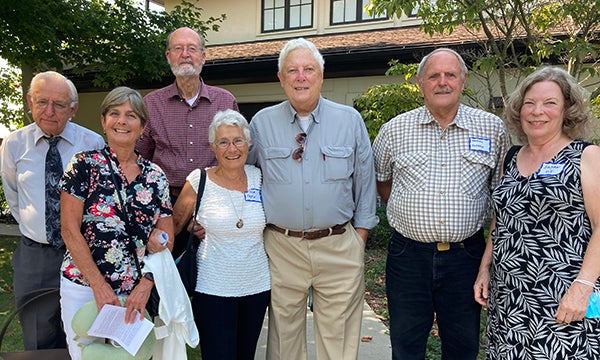 Attending the memorial service for GSO Librarian Technician Laura French on September 10 were several long-time members of the Bay Campus community. From left: Ed Dettmann (EPA), Roxanne Johnson (EPA), Sheldon Pratt (GSO), Lola Tapia-Lange, Ph.D. ’77, David Johnson (GSO), Dan Sheehy, M.S. ’72, Ph.D. ’77 and Dan’s wife Susan Vik.
Attending the memorial service for GSO Librarian Technician Laura French on September 10 were several long-time members of the Bay Campus community. From left: Ed Dettmann (EPA), Roxanne Johnson (EPA), Sheldon Pratt (GSO), Lola Tapia-Lange, Ph.D. ’77, David Johnson (GSO), Dan Sheehy, M.S. ’72, Ph.D. ’77 and Dan’s wife Susan Vik.
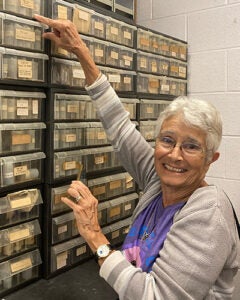 Lola Tapia-Lange, Ph.D. ’77, visited GSO for the first time since she graduated and was astonished to see some of her geological samples still in her old lab in the Horn Building. She also enjoyed walking the beach at the foot of South Ferry Road and reminiscing about swimming to Dutch Island.
Lola Tapia-Lange, Ph.D. ’77, visited GSO for the first time since she graduated and was astonished to see some of her geological samples still in her old lab in the Horn Building. She also enjoyed walking the beach at the foot of South Ferry Road and reminiscing about swimming to Dutch Island.
 Edward S. Taub, M.S. ’75 has been working at Intel in sunny California since 2011.
Edward S. Taub, M.S. ’75 has been working at Intel in sunny California since 2011.
1980s
 Margaret Leinen, Ph.D. ’80, the director of Scripps Institution of Oceanography, visited GSO on her annual trip to New England and caught up with other GSO graduates. She is one of only three U.S. representatives on the planning committee for the U.N. Ocean Decade Program.
Margaret Leinen, Ph.D. ’80, the director of Scripps Institution of Oceanography, visited GSO on her annual trip to New England and caught up with other GSO graduates. She is one of only three U.S. representatives on the planning committee for the U.N. Ocean Decade Program.
Mary J. Ratnaswamy, M.S.’82 retired from the U.S. Geological Survey.
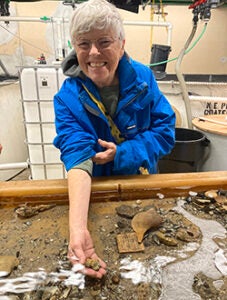 In September, Carol (Cummings) Vaseleski, M.S. ’76, Ph.D. ’83 visited the Bay Campus for the first time since earning her degree. While on a tour of the Ann Gall Durbin Aquarium Building, where in the 1970s she had set up a flowing seawater system. Carol was able to hold a piece of the type of coral on which she had focused her research: the Northern Star Coral, Astrangia danae.
In September, Carol (Cummings) Vaseleski, M.S. ’76, Ph.D. ’83 visited the Bay Campus for the first time since earning her degree. While on a tour of the Ann Gall Durbin Aquarium Building, where in the 1970s she had set up a flowing seawater system. Carol was able to hold a piece of the type of coral on which she had focused her research: the Northern Star Coral, Astrangia danae.
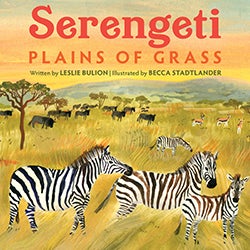 Leslie Bulion, M.S. ’84 writes that her most recent science poetry collection, “Serengeti: Plains of Grass” (Peachtree 2022), takes readers along on the great migration of wildebeests, zebras and others into and out of Tanzania’s Serengeti shortgrass plain following seasonal rains. Each page highlights a member of this ecosystem’s food web in a four-line stanza adapted from the Swahili utendi [a narrative form of Swahili poetry]. Her next “ecosystem approach” collection, “Galapagos: Islands of Change,” integrates the complex land-and-sea island ecosystem and will be published on March 1, 2023.
Leslie Bulion, M.S. ’84 writes that her most recent science poetry collection, “Serengeti: Plains of Grass” (Peachtree 2022), takes readers along on the great migration of wildebeests, zebras and others into and out of Tanzania’s Serengeti shortgrass plain following seasonal rains. Each page highlights a member of this ecosystem’s food web in a four-line stanza adapted from the Swahili utendi [a narrative form of Swahili poetry]. Her next “ecosystem approach” collection, “Galapagos: Islands of Change,” integrates the complex land-and-sea island ecosystem and will be published on March 1, 2023.

Jeff Frithsen, Ph.D. ’84, (sixth from right) and his wife, Elise Striz, returned to GSO via sailboat on their East Coast summer sailing adventure, which gave alums a good excuse to picnic on the beach at the end of South Ferry Road.
 Ken Hinga, M.S. ’74, Ph.D. ’84 is virtually back at URI, while still residing in Bethesda, Md., with his wife, Noelle Lewis, M.S. ’85. He has been teaching environmental science and oceanography for the Osher Lifelong Learning Institutes (OLLI) at American University and Johns Hopkins University since 2016. He expanded and is also giving classes for the OLLI program at both URI and UConn. Between classes Ken spends time in his woodworking shop, building furniture and other projects. He also has written a memoir, “Tales from the Trident and Some of Her Cousins.” The book compiles stories from his cruises on Trident, Endeavor and other ships—mostly in the 1970s. A copy is in the Pell Library.
Ken Hinga, M.S. ’74, Ph.D. ’84 is virtually back at URI, while still residing in Bethesda, Md., with his wife, Noelle Lewis, M.S. ’85. He has been teaching environmental science and oceanography for the Osher Lifelong Learning Institutes (OLLI) at American University and Johns Hopkins University since 2016. He expanded and is also giving classes for the OLLI program at both URI and UConn. Between classes Ken spends time in his woodworking shop, building furniture and other projects. He also has written a memoir, “Tales from the Trident and Some of Her Cousins.” The book compiles stories from his cruises on Trident, Endeavor and other ships—mostly in the 1970s. A copy is in the Pell Library.
Elizabeth Johns, Ph.D. ’84 retired from National Oceanic and Atmospheric Administration.
After returning from Norway, Paul Berkman, M.S. ’86, Ph.D. ’88 and his wife, Julie Hambrook, are settled in Falmouth, Mass., and are looking forward to welcoming friends. Paul is the chief executive officer of EvREsearch LTD; president of the Science Diplomacy Center; and coordinator, Arctic/Pan-Arctic Options projects supported by the National Science Foundation.
 Mike Sieracki, Ph.D. ’85, was recently appointed as the new director of the University of Maryland Center for Environmental Science Horn Point Laboratory.
Mike Sieracki, Ph.D. ’85, was recently appointed as the new director of the University of Maryland Center for Environmental Science Horn Point Laboratory.
1990s
Veronica Berounsky, Ph.D. ’90; David Borkman, M.S. ’00, Ph.D. ’02; and Steve Carey, Ph.D. ’83, teamed up to document and identify an unusual phytoplankton bloom that tinted the water red in the Pettaquamscutt Estuary this October. Steve provided drone footage to show the extent of the bloom. Veronica took water samples. And Dave counted and identified the organism, Prorocentrum minimum, a dinoflagellate. These “mahogany tides” are common in Chesapeake Bay, but not in R.I.
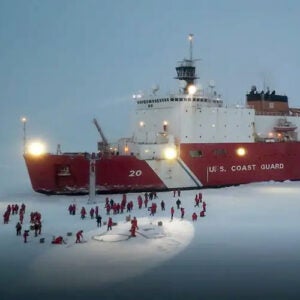 Carin Ashjian, Ph.D. ’91 and Bob Campbell, Ph.D. ’93 were on the U.S. Coast Guard Cutter Healy, an icebreaker, which reached the North Pole on September 30 after traversing the frozen Arctic Ocean. In a Coast Guard press release, Co-Chief Scientist Carin said, “We are excited to reach the Pole! We have little information from the ocean and seafloor at the top of the world, so what we collect here is very valuable. It also fills in data from a region, the western Central Arctic, which was not sampled by other ships in the Synoptic Arctic Survey. Our joint efforts with the Healy crew are producing important science results.” They returned to Dutch Harbor, Alaska, on October 28th
Carin Ashjian, Ph.D. ’91 and Bob Campbell, Ph.D. ’93 were on the U.S. Coast Guard Cutter Healy, an icebreaker, which reached the North Pole on September 30 after traversing the frozen Arctic Ocean. In a Coast Guard press release, Co-Chief Scientist Carin said, “We are excited to reach the Pole! We have little information from the ocean and seafloor at the top of the world, so what we collect here is very valuable. It also fills in data from a region, the western Central Arctic, which was not sampled by other ships in the Synoptic Arctic Survey. Our joint efforts with the Healy crew are producing important science results.” They returned to Dutch Harbor, Alaska, on October 28th
Sandra Whitehouse, Ph.D.’94 and her husband, U.S. Senator Sheldon Whitehouse, are proud to announce that they are grandparents for the first time, and they are enjoying this new role tremendously.
 On October 22, Catalina Martinez, M.S. ’99, received the GSO Dean’s Award, one of the honors given at the 2022 URI Distinguished Achievement Awards. Catalina is the regional program manager for National Oceanic and Atmospheric Administration (NOAA) Ocean Exploration (OE). She was recognized for her contributions to the URI community through her work with NOAA OE on site since 2004, as well as for the impacts of the diversity, equity, inclusion, access, and justice work she has participated in with the URI community and beyond for the past 25 years.
On October 22, Catalina Martinez, M.S. ’99, received the GSO Dean’s Award, one of the honors given at the 2022 URI Distinguished Achievement Awards. Catalina is the regional program manager for National Oceanic and Atmospheric Administration (NOAA) Ocean Exploration (OE). She was recognized for her contributions to the URI community through her work with NOAA OE on site since 2004, as well as for the impacts of the diversity, equity, inclusion, access, and justice work she has participated in with the URI community and beyond for the past 25 years.
2000s
 We had a blast on September 24 at GSO’s Science Saturday! Our graduates especially enjoyed the “Welcome Corner” by the quad and lunch at Mosby Center, where we could catch up with one another, some retired GSO staffers, and talk with GSO Dean Paula Bontempi, Ph.D. ’01.
We had a blast on September 24 at GSO’s Science Saturday! Our graduates especially enjoyed the “Welcome Corner” by the quad and lunch at Mosby Center, where we could catch up with one another, some retired GSO staffers, and talk with GSO Dean Paula Bontempi, Ph.D. ’01.
The fall meeting of the New England Estuarine Research Society (NEERS) was held in Providence, R.I., this November, with a symposium on “Urban Estuaries.” NEERS past President Susan Adamowicz, Ph.D. ’02 and NEERS’ President-elect Courtney Schmidt, M.S. ’09, Ph.D. ’14 worked with the local organizing committee, which included Veronica Berounsky, Ph.D. ’90, Walter Berry, Ph.D. ’87, and Autumn Oczkowski, Ph.D. ’09.
 In an article in Discover magazine, Dwight Coleman, M.S. ’01, Ph.D. ’03 notes the deepest parts of the ocean are some of the last unseen frontiers on Earth. But he and colleagues from institutions around the world seek to remedy this. Their goal is to map the ocean floor by 2030.
In an article in Discover magazine, Dwight Coleman, M.S. ’01, Ph.D. ’03 notes the deepest parts of the ocean are some of the last unseen frontiers on Earth. But he and colleagues from institutions around the world seek to remedy this. Their goal is to map the ocean floor by 2030.
Ben Jordan, Ph.D. ’04 was named the dean of the Faculty of Sciences at Brigham Young University-Hawaii as of Fall 2022.
On Sept. 15, Robinson “Wally” Fulweiler, M.S. ’03, Ph.D.’07, Candace Oviatt, Ph.D. ’67, and Ph.D. student Michael Potter II presented “A New Narragansett Bay, Recognizing Today’s Coastal Environment” at the R.I. Sea Grant Coastal State Discussion Series. They have been tracking changes in the bay as wastewater treatment facilities have reduced nutrients. Candace suggested that not reducing nutrients in the winter might be beneficial for quahogs and other fisheries.
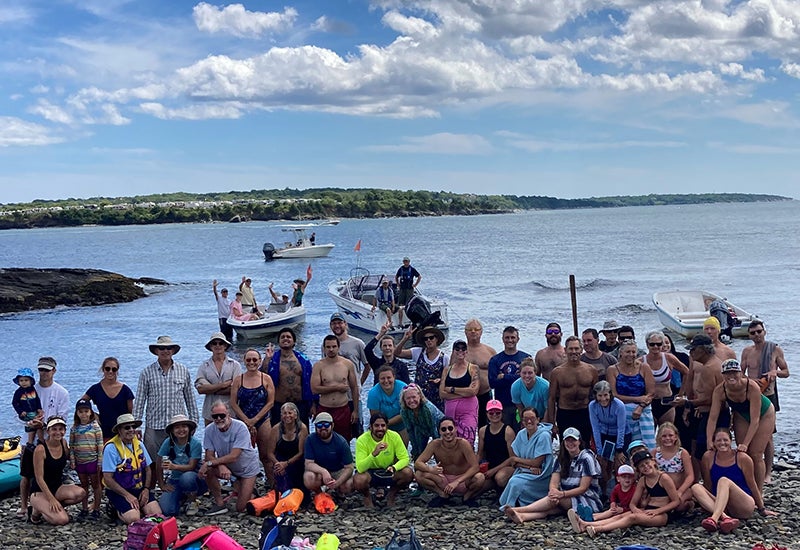 The Dutch Island Swim at GSO dates back to the 1970s. Graduates who took part this year as swimmers or safety personnel included: Rich Bell, Ph.D. ’09; Veronica Berounsky, Ph.D.’90; Katy Croff-Bell, Ph.D. ’11; Peter Doering, M.S. ’76, Ph.D. ’81; Mike Garr, Ph.D. ’86; Ben Grassian, Ph.D. ’22; Meredith Haas, M.S. ’22; Sam Katz, M.S. ’21; Dan O’Neil, M.S. ’81; Jerry Prezioso, M.S. ’91; Bob Sand, M.S. ’82; Hal Walker, Ph.D. ’91; and perhaps, most notable, was Ken Hinga, M.S. ’74, Ph.D. ’84, who participated in this event in 1972 and returned from Washington, D.C., this year to swim again—50 years later!
The Dutch Island Swim at GSO dates back to the 1970s. Graduates who took part this year as swimmers or safety personnel included: Rich Bell, Ph.D. ’09; Veronica Berounsky, Ph.D.’90; Katy Croff-Bell, Ph.D. ’11; Peter Doering, M.S. ’76, Ph.D. ’81; Mike Garr, Ph.D. ’86; Ben Grassian, Ph.D. ’22; Meredith Haas, M.S. ’22; Sam Katz, M.S. ’21; Dan O’Neil, M.S. ’81; Jerry Prezioso, M.S. ’91; Bob Sand, M.S. ’82; Hal Walker, Ph.D. ’91; and perhaps, most notable, was Ken Hinga, M.S. ’74, Ph.D. ’84, who participated in this event in 1972 and returned from Washington, D.C., this year to swim again—50 years later!
2010s
Leanna Heffner, Ph.D. ’13 and her husband, Larry Pokladnik, adopted their first child earlier this year. They all are enjoying this new adventure.
Sarah Flickinger, M.S. ’16 recently moved to the south of France for an opportunity as associate research scientist with the International Atomic Energy Agency Monaco Office working with the Global Ocean Acidification Observation Network.
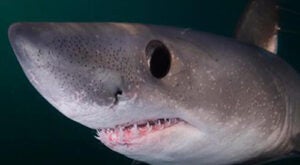 Ph.D. student Lauren (Benoit) Romeiro, M.O. ’17 and her husband, Joe, recently captured on film the rare porbeagle shark (Lamna nasus) during a night dive in the waters off Rhode Island. This is just the latest in their quest to document sharks around the world. If you tuned into Shark Week this past August on the Discovery Channel and saw “Dawn of the Monster Mako,” you saw the wonderful shark footage they took off the Azores.
Ph.D. student Lauren (Benoit) Romeiro, M.O. ’17 and her husband, Joe, recently captured on film the rare porbeagle shark (Lamna nasus) during a night dive in the waters off Rhode Island. This is just the latest in their quest to document sharks around the world. If you tuned into Shark Week this past August on the Discovery Channel and saw “Dawn of the Monster Mako,” you saw the wonderful shark footage they took off the Azores.
 Conor McManus, M.S. ’12, Ph.D. ’17 at the R.I. Department of Environmental Management, Division of Marine Fisheries, is working with researchers at NOAA and the Atlantic Shark Institute to learn what sharks are eating and (thanks to acoustic receivers deployed in local waters) where they swim. Conor appeared in two videos on WPRI.com: “Shark Patrol” and “The Belly of the Beast.”
Conor McManus, M.S. ’12, Ph.D. ’17 at the R.I. Department of Environmental Management, Division of Marine Fisheries, is working with researchers at NOAA and the Atlantic Shark Institute to learn what sharks are eating and (thanks to acoustic receivers deployed in local waters) where they swim. Conor appeared in two videos on WPRI.com: “Shark Patrol” and “The Belly of the Beast.”
Donald Rudnickas, M.S. ’18, was honored by the Coast Guard with the 2021 Captain Niels P. Thomsen Innovation Award in Science or Technology. Don developed a way to “accurately detect icebergs in multi-spectral satellite imagery, even in moderately cloudy conditions and among sea ice.”
2020s
 Anna Robuck, Ph.D. ’20 is now a chemistry principal investigator at the U.S. Environmental Protection Agency, Atlantic Coastal Environmental Science Division, in Narragansett, Rhode Island. Her team is working to produce impactful public-serving science on PFAS, contaminants and other areas.
Anna Robuck, Ph.D. ’20 is now a chemistry principal investigator at the U.S. Environmental Protection Agency, Atlantic Coastal Environmental Science Division, in Narragansett, Rhode Island. Her team is working to produce impactful public-serving science on PFAS, contaminants and other areas.
Kevin Rosa, Ph.D. ’20, founder of Current Lab, based in Newport, R.I., used his expertise to help marathon swimmer Ben Tuff plan his swim that covered the length of Narragansett Bay on July 22, 2022.
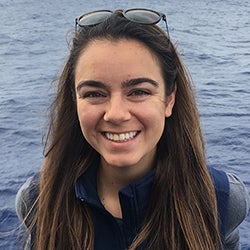 Basia Marcks, Ph.D. ’22, travels to Washington, D.C., in January to start her 2023 Sea Grant John A. Knauss Marine Policy Fellowship. Basia was one of 17 out of 86 fellowship finalists selected to work in the legislative branch, where she will work with members of Congress to draft and refine marine policy. She will serve as an expert scientist, helping curate data and information on which legislation will be based.
Basia Marcks, Ph.D. ’22, travels to Washington, D.C., in January to start her 2023 Sea Grant John A. Knauss Marine Policy Fellowship. Basia was one of 17 out of 86 fellowship finalists selected to work in the legislative branch, where she will work with members of Congress to draft and refine marine policy. She will serve as an expert scientist, helping curate data and information on which legislation will be based.
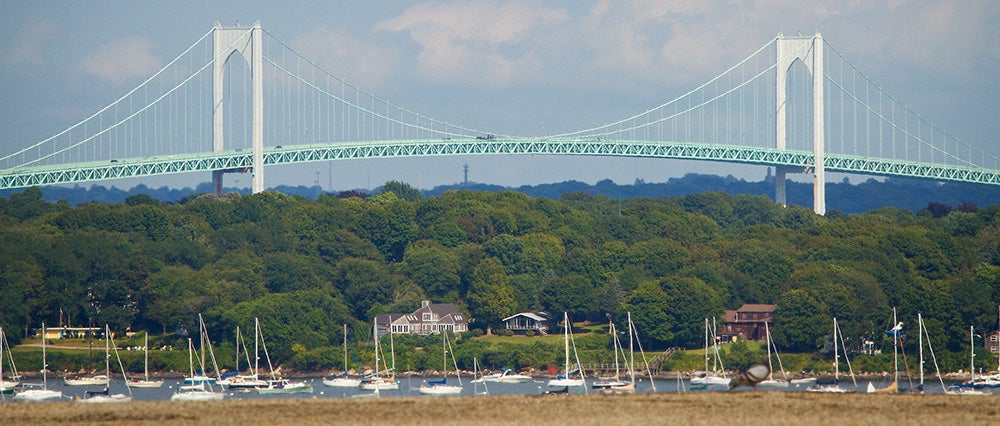
In Memoriam
Richard Arimoto
Richard “Rich” Arimoto, 70, was diagnosed with throat cancer on August 26, 2022, and, despite surgery, passed away on October 5 in Santa Fe, N.M., leaving his friends and family stunned at this loss. Rich came to GSO in the early 1980’s to work as a postdoctoral fellow in atmospheric chemistry for Professor Robert Duce, and they worked together for over 20 years on research projects around the world and cruises in both the Pacific and Atlantic Oceans. Bob wrote remarks for Rich’s memorial service held on October 29. “Rich was recognized as a world-class expert in the atmospheric and oceanic sciences. He was also an amazing writer. He had a unique ability to take complex data and concepts and make them clear to both specialists and non-specialists. He was a co-author with me on well over 30 peer-reviewed scientific papers.” In total, Rich had over 80 scientific publications. In addition to being a scientist, Rich loved to go deep sea fishing, lobstering, waterskiing and motorcycle touring. His passion in retirement was to volunteer for the Santa Fe Humane Society Pet Outreach Program and visit hospitalized patients with his corgi. Contributions in Rich’s memory may be made to that program.
John F. McCarthy
John F. McCarthy, Ph.D. ’75, of Loudon, Tenn., died Saturday, June 25, 2022, at the age of 75. He is survived by his wife, Carla Gunderson, and daughter, Lara Mazankowski (Scott), of San Diego. A memorial service was held on Aug. 11th. John earned his B.S. in Biology from Fordham University. At GSO, he was a student of Professor Akella Sastry in biological oceanography. Jim Yoder remembers John as “a very kind and fun person to be around.” From 1976 to 1979 he worked as a postdoctoral investigator with the University of Tennessee (UT) Graduate School of Biomedical Sciences. John eventually became a senior research scientist in the Environmental Sciences Division at the Department of Energy’s Oak Ridge National Laboratory. He was also a faculty associate in the graduate program in ecology at UT and a member of the United Nations Environmental Program’s scientific advisory committee for the marine mammal action program. Contributions in John’s memory may be made to The Nature Conservancy or to the university affiliation of your choosing.
David R. Schink
Former GSO professor David R. Schink, of Middleton, Wis., passed away in his sleep on May 11, 2022, at the age of 90. A native Californian, he received his undergraduate degree from Pomona College. He received his Ph.D. in chemical oceanography from the Scripps Institute of Oceanography, University of California, San Diego in 1963. He was then hired by the dean of GSO, John A. Knauss, as faculty at the newly established GSO. Since the R/V Trident was transiting from San Diego to Rhode Island at that time, David’s vehicle (along with the vehicle of Dale Krouse, another new GSO faculty member) made the trip on the ship. David was on the GSO faculty from 1962 to 1966. He spent the last 26 years of his career as a professor in the Department of Oceanography at Texas A&M University. There David interacted with future GSO Dean Paula Bontempi who was working toward her master’s degree. Paula noted, “I took my first chemical oceanography class, at Texas A & M, with Dave Schink. He was a good teacher and smart man. Tough, but I learned a lot in his class. He was always up for a conversation about ocean chemistry!”
Charles (Chip) Young
Charles “Chip” S. Young, III, passed away from a heart condition on August 24, 2022, at the age of 72. Chip worked in media outreach for Rhode Island environmental organizations such as Save the Bay, as well as at the URI Coastal Resources Center and Coastal Institute. Chip was well known for his writing skills, whether it be the infamous opinion column “Philippe & Jorge’s Cool, Cool World” with Rudy Cheeks or more serious science such as sections of the Ocean Special Area Management Plan (SAMP). Nate Vinhateiro at the Coastal Institute remarked, “Chip worked with us on an op-ed just this past spring. Collaborating with him was always a treat.” No service is planned. If you wish to make a donation in Chip’s memory, consider supporting coastal or marine research, education or preservation.

